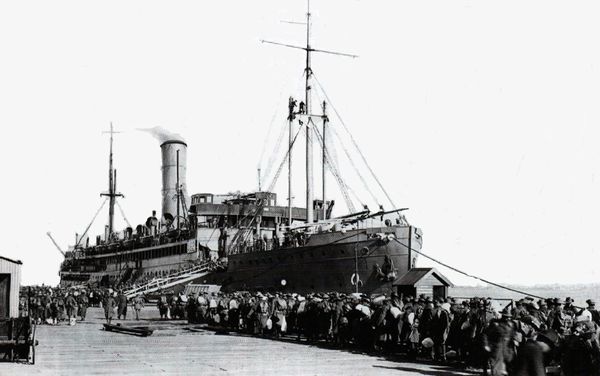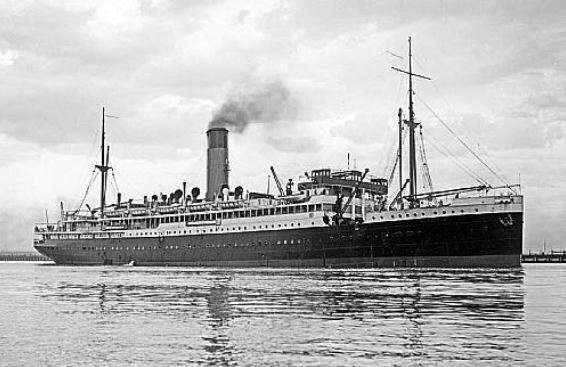Difference between revisions of "HMAT A62 Wandilla"
From Our Contribution
| (14 intermediate revisions by the same user not shown) | |||
| Line 1: | Line 1: | ||
| − | {{Infobox | + | {{Infobox ship |
| − | | | + | | image = [[File:HMAT_A62_Wandilla_at_Port_Melbourne.jpg|border|600px]] |
| − | + | | caption = Men of the 3rd Pioneer Battalion at Port Melbourne destined for the Western Front. 6 Jun 1916. (AWM PB1150) | |
| − | + | | image2 = [[File:HMAT_A62_Wandilla.jpg]] | |
| − | |||
| − | |||
| − | |||
| − | |||
| − | | caption = Men of the 3rd Pioneer Battalion at Port Melbourne destined for the Western Front. 6 Jun 1916. (AWM PB1150) | ||
| − | | | ||
| caption2 = | | caption2 = | ||
| + | | shipname = HMAT A62 Wandilla | ||
| + | | shipowner = Adelaide Steamship Company | ||
| + | | shipbuilder = William Beardmore & Co, Glasgow | ||
| + | | shipyardnumber = 506 | ||
| + | | shiplaunched = 25 May 1912 | ||
| + | | shipcompleted = 6 Oct 1912 | ||
| + | | shipinservice = | ||
| + | | shipoutofservice = | ||
| + | | shipinservice2 = | ||
| + | | shipoutofservice2 = | ||
| + | | shipreclassified = | ||
| + | | shipID = | ||
| + | | shipfate = Sunk by British aircraft | ||
| + | | shiptype = passenger / cargo | ||
| + | | shiptonnage = 7,785 tons | ||
| + | | shiplength = 411.25 ft (125.35m) | ||
| + | | shipbeam = 56.5 ft (17.22m) | ||
| + | | shipdepth = 34.1 ft (10.39m) | ||
| + | | shippropulsion = twin screw | ||
| + | | shipspeed = 14.5 knots (26.85kph) | ||
| + | | shipcapacity = | ||
| + | }} | ||
| − | |||
| − | |||
| − | |||
| − | + | ==Remarks== | |
| + | Built for the Adelaide Steamship Company and used on the Fremantle to Sydney run until acquired for military service. | ||
| − | |||
| − | |||
| − | + | The ship was initially used as a troop transport under the designation His Majesty's Australian Transport (HMAT) Wandilla, and on two round journeys delivered Australian soldiers to and from Egypt. Made one journey to England as a troop ship, before in July 1916, the vessel was converted into a hospital ship. While serving as a hospital ship, she was torpedoed by a U-boat in February 1918, although the torpedo failed to explode. Wandilla was manned by Australian officers and during part of her service, Australian crews. | |
| − | |||
| − | |||
| − | |||
| − | + | After the war she was sold in 1921 to Bermuda & West Indies SS Company (1921–1935), and then Lloyd Triestino (1935–1940), and in 1940 as the ''SS Arno'' she was used by the Italian government as a hospital ship again. The Arno was sunk by aerial torpedoes from the Royal Air Force on 10 September 1942, about 40 miles (64 km) north-east of Ras el Tin, near Tobruk. It has been claimed by the British that a German radio message decoded on 31 August 1942 showed that the ship was being used to carry supplies to Benghazi in violation of the Hague Convention, making it a justified attack. Others have called the sinking of the hospital ship a war crime that was not investigated following the end of the war. | |
| − | |||
| − | + | ==Medical Staff== | |
| − | |||
| − | |||
| − | |||
| − | |||
| − | |||
| − | |||
| − | |||
| − | |||
| − | |||
| − | |||
| − | + | ===Port Suez to Fremantle 18 December 1915 - 14 January 1916=== | |
| + | * [[Francis William Singleton]] | ||
| − | |||
==Soldiers carried== | ==Soldiers carried== | ||
| − | == | + | ===Melbourne to Port Suez 17 June - 18 July 1915=== |
| − | *[[Frederick Douglas Atlee Bowra]] | + | Embarked in Fremantle on 25 June |
| − | *[[Stanley Joseph Callow Champion]] | + | * [[Frederick Douglas Atlee Bowra]] |
| − | *[[George Weston Firns]] | + | * † [[Stanley Joseph Callow Champion]] |
| − | *[[Alice Maud Martin]] | + | * [[George Weston Firns]] |
| − | *[[Euphemia Weir Huntley Scott]] | + | * [[Alice Maud Martin]] |
| + | * [[Euphemia Weir Huntley Scott]] | ||
| − | ==Melbourne to Port Suez 9 November - 6 December 1915== | + | ===Melbourne to Port Suez 9 November - 6 December 1915=== |
*[[John Edward Thomson]] | *[[John Edward Thomson]] | ||
| − | ==Port Suez to Fremantle 13 December 1915 - 14 January 1916== | + | ===Port Suez to Fremantle 13 December 1915 - 14 January 1916=== |
*[[Vernon Claude Witney]] | *[[Vernon Claude Witney]] | ||
| − | ==Melbourne to Plymouth 6 June 1916 - 26 July 1916== | + | ===Melbourne to Plymouth 6 June 1916 - 26 July 1916=== |
*[[Alfred Ernest Andrews]] see photo above | *[[Alfred Ernest Andrews]] see photo above | ||
| − | *[[Clarence Henry Batt]] | + | *[[Clarence Henry Batt]] see photo above |
| − | *[[Ernest Albert Batt]] | + | *[[Ernest Albert Batt]] see photo above |
| − | *[[John Aubrey Nunn MC]] | + | *[[John Aubrey Nunn MC]] see photo above |
*[[Michael Dennis O'Rourke]] | *[[Michael Dennis O'Rourke]] | ||
| − | ==West Beirut to Alexandria 30 November - 1 December 1918== | + | ===West Beirut to Alexandria 30 November - 1 December 1918=== |
*[[John Henry Hart]] | *[[John Henry Hart]] | ||
| + | ===Other Voyages=== | ||
| + | * 31 January 1916 from Brisbane & 3 February 1916 from Sydney | ||
[[Category:Ships]] | [[Category:Ships]] | ||
Latest revision as of 15:54, 12 October 2021
Contents
Remarks
Built for the Adelaide Steamship Company and used on the Fremantle to Sydney run until acquired for military service.
The ship was initially used as a troop transport under the designation His Majesty's Australian Transport (HMAT) Wandilla, and on two round journeys delivered Australian soldiers to and from Egypt. Made one journey to England as a troop ship, before in July 1916, the vessel was converted into a hospital ship. While serving as a hospital ship, she was torpedoed by a U-boat in February 1918, although the torpedo failed to explode. Wandilla was manned by Australian officers and during part of her service, Australian crews.
After the war she was sold in 1921 to Bermuda & West Indies SS Company (1921–1935), and then Lloyd Triestino (1935–1940), and in 1940 as the SS Arno she was used by the Italian government as a hospital ship again. The Arno was sunk by aerial torpedoes from the Royal Air Force on 10 September 1942, about 40 miles (64 km) north-east of Ras el Tin, near Tobruk. It has been claimed by the British that a German radio message decoded on 31 August 1942 showed that the ship was being used to carry supplies to Benghazi in violation of the Hague Convention, making it a justified attack. Others have called the sinking of the hospital ship a war crime that was not investigated following the end of the war.
Medical Staff
Port Suez to Fremantle 18 December 1915 - 14 January 1916
Soldiers carried
Melbourne to Port Suez 17 June - 18 July 1915
Embarked in Fremantle on 25 June
- Frederick Douglas Atlee Bowra
- † Stanley Joseph Callow Champion
- George Weston Firns
- Alice Maud Martin
- Euphemia Weir Huntley Scott
Melbourne to Port Suez 9 November - 6 December 1915
Port Suez to Fremantle 13 December 1915 - 14 January 1916
Melbourne to Plymouth 6 June 1916 - 26 July 1916
- Alfred Ernest Andrews see photo above
- Clarence Henry Batt see photo above
- Ernest Albert Batt see photo above
- John Aubrey Nunn MC see photo above
- Michael Dennis O'Rourke
West Beirut to Alexandria 30 November - 1 December 1918
Other Voyages
- 31 January 1916 from Brisbane & 3 February 1916 from Sydney

